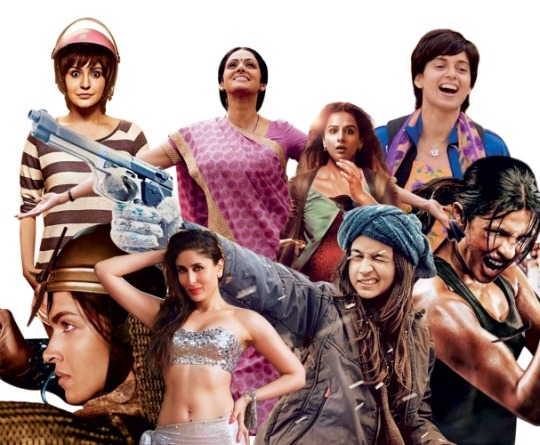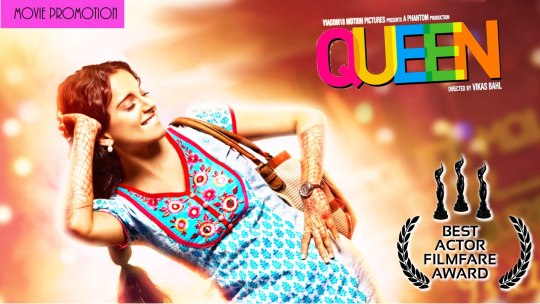#feministbollywood
By Vrinda Trivedi

Growing up, I was totally enamored by the sheer beauty and elegance with which Bollywood actresses carried themselves on screen. One of my earliest memories is listening to the song Rangeela(1995) and seeing a cowboy boot-clad Urmila Matondkar shimmy around in the middle of the street to the peppy beat. Over a decade later, I still love the music and cinematography that Bollywood churns out at an unbelievable rate.
However, over the years, as I’ve allowed the term “feminist” to envelope me and my worldview, Bollywood has started to become a personally contentious issue. And I know i’m not the only person out there either, that rolled my eyes after watching Ranbir Kapoor character Bunny “suddenly” fall in love with Deepika Padukone’s Naina after she became conventionally hotter (got rid of her glasses, wore tighter clothes, etc.) in Yeh Jawani Hai Dewaani (2013). And honestly, despite that and many other equally regressive scenes (i.e. when Aditya Roy Kapur’s character insults a woman who calls him out for ogling her), I still watched the movie multiple times, my guilt growing each time. So for a while, I indulged myself in this cycle of watching a problematic film, enjoying the music and visuals, feeling guilty and repeat. With each new movie was a tried-and-true formula of portraying the 20-something actress as little more than a damsel in distress. Female character development is typically limited to one or two vapid scenes of the heroine declaring her decision to marry the boy, against her family’s wishes. Or at least, such was the status quo for the last few decades. However, increasingly, lesser-known Bollywood filmmakers have begun creating more progressive films, such as Queen (2014) and Titli(2015).

When Queen was first released in 2014, it was received with across-the-board applause, and quickly became the token feminist film for Bollywood viewers and producers. Critics and the public alike enjoyed the film and its refreshing take on independence and womanhood. The movie chronicles the symbolic and physical journey of a young Punjabi woman, Rani Mehra, as she is left by her fiancee, her life seemingly ruined. She then chooses to go on her honeymoon across Europe by herself, which results in a steady rise in confidence and radical self love, albeit with some significant bumps in the road.
What pleased me most about Queen was Rani’s slow realization that radical self love was not only important, but actually necessary. Beyond physical and economic independence from previous sources of stability and dependence, she was able to come to terms with her own need for support and approval and embrace her freedom. This theme of self-acceptance was overtly demonstrated in a variety of impactful scenes. Rather, the character’s intentionality in stepping out of her comfort zone, and a heartbreakingly relatable and accessible dialogues were able to display her level of growth throughout the film.
In the past, Bollywood films have never made it a point to emphasize the character growth of female characters, much less actually write a script that involves any internal growth at all. Bollywood has made a few rare attempts at pseudo-feminism, which typically is carried out in an incredibly dramatic scene where the heroine slaps a thug who may have insulted her. Or more typically, she will shout out her macho love interest’s name, who comes to the rescue by thrashing the ruffian, thus protecting the heroine’s honor. The damsel in distress archetype is one that has undoubtedly permeated mainstream Bollywood for generations upon generations, with the exception of a small group of older and recent notable outliers such as Khoon Bhari Maang(1988),Mardaani(2014),Kahaani (2012; which draws on interesting concepts of the Goddess, motherhood, and power), and Fire(1996; although Fire is not mainstream Bollywood).
However, having a strong female lead is not enough to categorize a film as feminist, and this is where Queen is able to excel. Rani never relies on her macho friends to beat up harassers, or delivers an isolated monologue on the ills of society. Instead, by the end of the film, she loudly and unapologetically loves who she is, which I feel is one of the most radical and powerful feminist statements that a young, woman of color woman can make.
Vrinda Trivedi is a junior Women’s, Gender, and Sexuality Studies, and Political Science double major at the College of Wooster. Born in South Africa to an Indian immigrant family, and raised in Cleveland, she enjoys exploring intersections of identity. Her academic interests address these intersections, as she is in the midst of writing a thesis entitled, “Okay Ladies Now Let’s Get in Formation: A Comparative Analysis of the Development of Grassroots Women’s Movements Post-Civil Conflict.”
